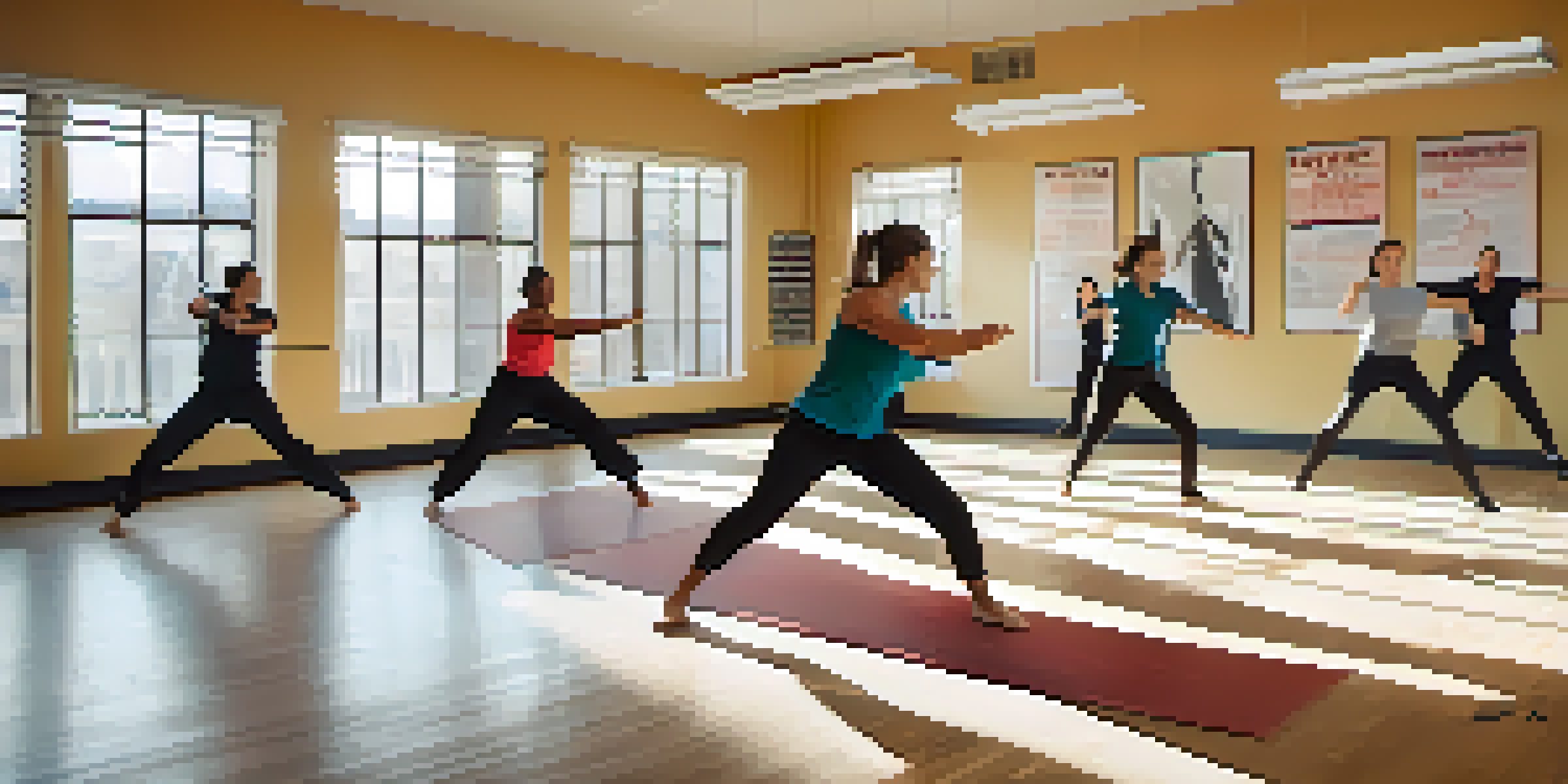Women's Self Defense: The Role of Strength and Technique

Understanding the Importance of Self-Defense for Women
Self-defense isn't just about physical strength; it's a crucial skill for women. In an unpredictable world, knowing how to protect oneself empowers individuals and boosts confidence. It's about having the tools and mindset to face potential threats head-on, whether in public spaces or at home.
The best defense is a good offense.
Many women feel vulnerable in certain situations, and self-defense training can help mitigate those feelings. By learning self-defense techniques, women can reclaim their sense of safety and autonomy, transforming fear into empowerment. This training not only equips them with physical skills but also enhances their mental resilience.
Moreover, self-defense is about community and support. Classes often create a safe environment where women can share experiences and learn from each other, fostering a sense of camaraderie. This social aspect enhances the learning experience, making it more approachable and less intimidating.
The Role of Physical Strength in Self-Defense
Physical strength can significantly enhance a woman's ability to defend herself. While technique is crucial, having a good level of strength can provide the necessary power behind moves and maneuvers. This doesn't mean you need to be a bodybuilder; rather, it’s about being fit enough to execute techniques effectively.

Strength training can complement self-defense techniques, making them more effective. For example, a strong core can help with balance during a defensive maneuver, while upper body strength can aid in breaking free from grips. Many self-defense programs incorporate strength-building exercises to prepare participants physically and mentally.
Empowerment Through Self-Defense
Self-defense training helps women reclaim their sense of safety and confidence in their ability to face potential threats.
Furthermore, building strength can boost confidence. As women see their physical capabilities improve, they often feel more empowered in their daily lives, not just in self-defense situations. This newfound confidence can translate into a more assertive presence, which might deter potential threats.
Techniques: The Foundation of Effective Self-Defense
Technique is where the art of self-defense truly shines. Knowing how to use your body effectively can make all the difference in a critical situation. Techniques such as strikes, blocks, and escapes are essential skills that can be learned and mastered through practice.
Self-defense is not just a skill, it's a mindset.
In self-defense, technique often outweighs brute strength. A smaller, weaker person can successfully defend themselves against a larger attacker by using leverage and proper technique. For instance, learning how to redirect an attacker's energy can turn the tables in a dangerous situation.
Moreover, practicing techniques builds muscle memory. This means that in a high-stress situation, a woman is more likely to instinctively remember and execute what she has practiced. Regular training not only sharpens these skills but also instills a sense of preparedness and calm.
Combining Strength and Technique for Maximum Effectiveness
The most effective self-defense strategies blend both strength and technique. While technique helps you to execute moves properly, physical strength amplifies those techniques, making them more powerful. This combination ensures that women can defend themselves against a range of potential attackers.
Consider a scenario where a woman uses a strong, well-placed elbow strike against an assailant. The strength adds impact, while the technique ensures precision. This synergy is what makes self-defense training so vital; it prepares individuals to respond adeptly in real-life situations.
Strength and Technique Matter
Combining physical strength with proper techniques enhances self-defense effectiveness and boosts overall confidence.
Training that focuses on both aspects helps build a well-rounded skill set. Women who participate in these programs often report feeling more capable and ready to face challenges. This holistic approach not only prepares them physically but also mentally, fostering a sense of empowerment.
Mental Preparedness: A Key Component of Self-Defense
Self-defense is as much a mental exercise as it is a physical one. Being mentally prepared to respond to a threat can significantly improve a woman's chances of escaping a dangerous situation. This mindset is cultivated through training and practice, helping individuals stay calm and focused.
Visualization techniques can enhance mental preparedness. By imagining potential scenarios and rehearsing responses, women can reduce anxiety and feel more equipped to handle real-life situations. This mental rehearsal complements physical training, creating a comprehensive self-defense strategy.
Additionally, mental preparedness involves understanding one’s surroundings and recognizing potential threats. Self-defense training often emphasizes awareness, encouraging women to trust their instincts. This heightened awareness can often serve as the first line of defense.
Building a Supportive Community Through Self-Defense Training
Self-defense classes often foster a sense of community among participants. Women come together to learn, share experiences, and support each other in their journey toward empowerment. This shared experience can create lasting friendships and a strong network of support.
A supportive environment encourages women to step out of their comfort zones. In these classes, they can practice techniques without fear of judgment, allowing them to gain confidence in their abilities. This camaraderie makes the learning process more enjoyable and less intimidating.
Community Support is Essential
Self-defense classes foster a supportive community where women can share experiences and motivate each other in their empowerment journey.
Moreover, having a community can enhance accountability. When women train together, they motivate each other to continue their practice and refine their skills. This shared commitment to self-improvement can lead to lifelong friendships and a stronger sense of security.
Finding the Right Self-Defense Program for You
Choosing the right self-defense program is crucial for maximizing benefits. Look for classes that focus on practical techniques and incorporate strength training. Programs should also foster a supportive environment, ensuring that all participants feel safe and encouraged.
Researching different styles of self-defense is essential. Each program may emphasize different techniques or philosophies, so finding one that resonates with you is important. Consider attending introductory classes to see which approach feels right before committing long-term.

Lastly, don’t forget to consider the instructor’s qualifications and teaching style. A great instructor will not only be knowledgeable but also passionate about empowering women. Their ability to create a positive learning environment can make all the difference in your self-defense journey.